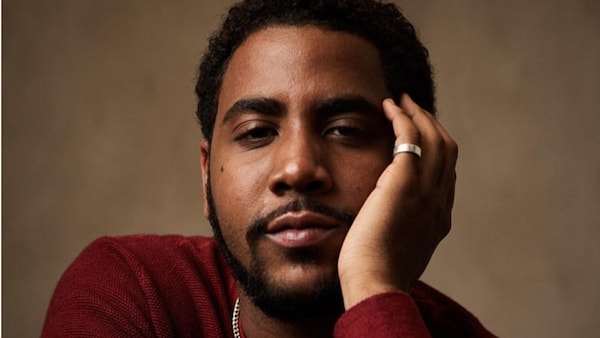Exclusive | Emmy winner Jharrel Jerome: It's important to be a part of projects that support the Black community just because, you know, Hollywood...
The Emmy-winning actor, who burst onto mainstream Hollywood with the Oscar-winning film Moonlight, talks exclusively to OTTplay about his latest project, standing in solidarity with people of colour..

Last Updated: 11.02 PM, Jun 26, 2023
One look at the very-young Jharrel Jerome’s career, and you know already that the question one needs to be asking is not if he is going to win an Oscar, it is more like when. As Kevin in the Academy-winning film Moonlight (2016), Jerome left us awestruck with his raw and real depiction of a Black man finding his place in the world and now, as Cootie in Prime Video’s I’m A Virgo, he will leave you in splits.
Jerome, all of 25, took home the Primetime Emmy Award for Outstanding Lead Actor in a Limited Series or Movie back in 2019 for his humane depiction of Korey Wise—one of the falsely accused and convicted members of what came to be known as the Central Park 5 in America and the world over.
Edited excerpts from our conversation with the breakout star:
I have watched the show and I thought it is outstanding. I really wanted to know from you, how did you imbibe the characteristic traits of a teenager who is 13 ft tall and, you know, has all these quirks and has not even seen life outside of his home for 19 whole years. How does one get into the skin of a character like that?
JJ: There were a lot of elements to preparing for the role. What a lot of people think is that I studied tall people and just walked around asking people who are 6’5, what it's like to be tall, which I could have done. But, to me, actually, it wasn't about the height of the character because if you think about it, Cootie wakes up every day and he's used to being 13 ft tall. It's not new to him. It's nothing shocking for him. So, he's already settled into how big he is.
For me, it was figuring out what his mannerisms were and his characteristics were. And I realized that he's very naive and he's very, he's very smart and intelligent, but very new to the world and very socially awkward. So, I was trying to figure out ways how to remain bright-eyed, to remain curious and kind of experiment with a 13-year-old soul and moving around as if I was younger.
You have worked in an Oscar-winning film (Moonlight, 2016) and have won an Emmy yourself for your fantastic portrayal of Korey Wise in the miniseries When They See Us (2019). And one common theme of your career—based on my observations—is that it always talks about the life and struggles of a Black person, the Black community, and obviously, with strong commentary on racism. Why is it so important for you to be attached to such projects?
JJ: Well, I think it's important to be a part of projects that support the Black community that are involved with the Black community just because, well, you know, Hollywood. Hollywood has been the same way for a long time. And I think in the past few years, we've seen a shift in stories and not just within Black stories, but Asian stories as well, and female stories as well.
And I think (with) art, it is incredibly necessary to continue to push forward the social dynamics. And so to be able to work on a project that speaks to a culture at large and, and a social issue at large. I just think it becomes more than being an actor. It almost makes being a human more important and more fun.
Like you rightly mentioned, slowly but surely, the world is taking notice of people of colour on global platforms and that includes India, which was recognized at the recently held Oscars. So, what do you have to say about the recognition that has come? It was long overdue, don't you think?
JJ: Absolutely, very long overdue! And it's beautiful to see that recognition, and beautiful to see how incredible storytelling can be from different perspectives and different cultures. And it's amazing to watch something and feel like you're learning.
I wanted to know from you, Sorry To Bother You was a thought-provoking and mind-bending project on so many levels. So, what was your first conversation like with Mr Riley (director)? And, what was the brief or prompt that had come from him to you?
JJ: You know, the initial conversations about I'm A Virgo definitely brought Sorry To Bother You up a ton because, to me, I think I'm A Virgo is Sorry To Bother You on steroids. I think Boots started off with a topic and a conversation with Sorry To Bother You, and he continues it in Virgo and executes it in a lot of different ways that kind of dig deeper into things that are under the umbrella of capitalism.
And so, I love Sorry To Bother You so much. And I think if you love Sorry To Bother You, (then) you'll love Virgo just as much or even more. Because, yeah, like I said, it's an extended version of the conversations he was having before.

 Premium
Premium